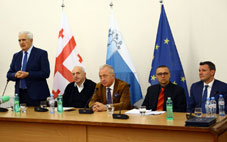
11 thousand Georgians die from tobacco every year
By Tea Mariamidze
Friday, March 31
Tobacco consumption is a global problem which causes many diseases and reduces vitality. Georgia, in this term, takes the second place in Europe. Eleven thousand people die of tobacco consumption every year in Georgia, with three thousand people among them being passive smokers.
Moreover, around 1.5 million Georgians are active smokers, of whom 15 percent are underage children.
In 2003, public instances have prohibited smoking on many premises but it lacked of the political will and respective economic conditions. Today, smoking is prohibited only in hospitals and schools but 35% of population remains smokers, including women and children.
The alarming statistics were introduced to Georgian lawmakers by representatives of World Health Organization (WHO) at the meeting in parliament on Wednesday.
At the meeting, the MPs and WHO representatives spoke about the necessity of legislative reform on tobacco control in the country.
The guests stated that Georgia remains among the few countries where smoking in public places is allowed. They urged the authorities to take active steps in this direction.
The representatives of the WHO introduced the problems encountered by the parliaments upon severing tobacco control by the importer organizations and industries.
A representative of UNDP Geneva Representation Health and Development Program, Dudley Tarlton, in his presentation noted that the mission will submit the report on financial-economic aspects of tobacco control in the nearest future allowing in-depth analysis for MPs and all parties concerned upon development of the respective reform and in further implementation. He offered international expert engagement and technical support to Georgia.
“It is very important to ban smoking in public places. You need laws which will regulate this filed,” Tarlton said.
The WHO Georgia Office Head, Marijan Ivanusa, stated that the two missions of the Secretariat will visit Georgia upon consideration of the draft to render technical assistance in correct planning of the processes.
Georgia has been an applicant country of the WHO Framework Convention on Tobacco Control (WHO FCTC) since 2004, which means that the country has undertaken obligations to fulfill all the demands of the Convention.
The WHO FCTC is the first international treaty negotiated under the auspices of the WHO. It was adopted by the World Health Assembly on 21 May 2003 and entered into force on 27 February 2005. It has since become one of the most rapidly and widely embraced treaties in United Nations history.
The WHO FCTC was developed in response to the globalization of the tobacco epidemic and is an evidence-based treaty that reaffirms the right of all people to the highest standard of health. The Convention represents a milestone for the promotion of public health and provides new legal dimensions for international health cooperation.
Georgian MPs pointed out at the meeting that they already have a draft bill on Tobacco Control, which will be included into the plenary agenda on April 5-7.
The authors of the bill predict that the regulations will enter into force from the next year. The regulation will also ban smoking in restaurants, bars and other facilities. Moreover, the bill will prohibit tobacco advertising and popularization and warning campaign about the tobacco consumption risks will increase from 30% from 50%.
The WHO representatives also held a meeting with the students and Non-Governmental Organizations in Tbilisi State University and discussed ways of reducing tobacco consumption in Georgia.


